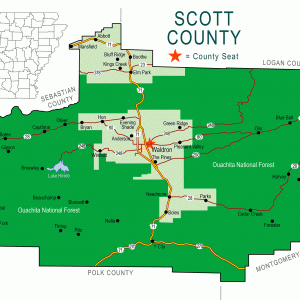calsfoundation@cals.org
Little Texas (Scott County)
Little Texas is an unincorporated community located in eastern Scott County. The community was established in 1870 south of the Fourche La Fave River along Weaver Creek. Weaver Creek was named for the Weaver family who settled in Little Texas. Agriculture has traditionally contributed to the economy and way of life in Little Texas.
Prior to European exploration, the area surrounding Little Texas was a wilderness. Several species of wildlife that no longer inhabit the area, such as elk and buffalo, were present throughout the region. Numerous archaeological sites and burial mounds can be found along the banks of prominent water ways such as the Fourche La Fave River. Archaeological findings have provided evidence of early inhabitants dating to the Archaic, Woodland, and Mississippian periods. Further archaeological evidence has indicated that the people of the Caddo tribe later inhabited the area.
During the late seventeenth and early eighteenth centuries, French hunters and tradesmen traveled west from the Arkansas Post exploring portions of western Arkansas. These Frenchmen often traversed rivers and streams throughout the region. Several rivers that flow through Scott County were likely named by these French explorers, including the Petit Jean, Poteau, and Fourche La Fave. It is probable that they traveled along the Fourche La Fave River near present-day Little Texas.
Settlers began arriving in Little Texas and the surrounding area during the late 1830s and early 1840s. The area was continually settled through the early twentieth century. Settlers participated in a wide variety of agricultural practices, including cotton farming.
Men called to fight in the Civil War served with both the Confederacy and Union. The women, children, and elderly were left to look after family homes and farms. Instances of bushwhacking occurred in the area during the Civil War.
During Reconstruction, many settlers traveled west to Arkansas from war-torn regions of the South in order to start a new life. In 1870, several settlers, including Mary Elizabeth Ford and William Martin McIntyre, traveled on a wagon train led by William McCormick and his wife, Mary Weaver. The train originated in Mississippi and was destined for the state of Texas. By the time they arrived in the community of Nebraska in Scott County, several of their oxen had gotten sick and died. They decided they could not go any farther and ended their journey to Texas. Each family on the wagon train chose homesteads in the area and established the community as Little Texas.
Sometime between January 1887 and October 1889, the Little Texas School District (Number 73) was formed. The school house was also locally known as McCormick’s School House. The school house was named for William A. McCormick, who helped establish Little Texas Township.
There is no cemetery located directly in Little Texas, so residents made use of the nearby Monroe Cemetery in Harvey (Scott County).
In 1913, Spiller Post Office was established near Little Texas to serve Little Texas Township. The post office was named for Spiller Creek, which flows near the community, which itself was named for early settlers of the region, James and William Spiller. Little Texas Township was formed three years prior to the post office being established in 1913. David M. Kitchens and Charles A. Kitchens served as the first and second postmasters of the post office, which closed in 1915. The mail was sent to Gravelly (Yell County) when the post office was discontinued. The post office also served as a general store for William D. Utley.
The Little Texas School District was consolidated with Fourche Valley in Yell County sometime between 1949 and 1953. The loss of citizens in Little Texas led to the closure of businesses and institutions.
Agriculture continues to be a prominent way of life in Little Texas, mostly in the form of cattle and chicken farms. Hunting and fishing are popular recreational activities in the area. Little Texas is served by the Harvey Volunteer Fire Department.
For additional information:
Cate, Michael. History of Scott County, Arkansas. Dallas, TX: Curtis Media Corporation, 1991.
Echoes: The Scott County Historical and Genealogical Society Quarterly. Waldron, AR: Scott County Historical and Genealogical Society (1986–).
Goodner, Charles. Scott County in Retrospect. Mansfield, AR: Frank Boyd, 1976.
Goodner, Norman. A History of Scott County, Arkansas. Siloam Springs, AR: Bar D Press, 1941.
McCutcheon, Henry Grady. History of Scott County, Arkansas. Little Rock: H. G. Pugh and Company, 1922.
Ty Richardson
Richardson Preservation Consulting
 Scott County Map
Scott County Map 



Comments
No comments on this entry yet.